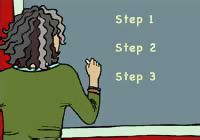How might Ms. Price provide help to meet the individual needs of all her students, including those with disabilities?
Page 4: Task Scaffolding
 Another type of instructional scaffolding is referred to as task scaffolding. In this type of scaffolding, a teacher begins by specifying the steps in a task or instructional strategy. He or she then models the steps in the task, verbalizing his or her thought processes for the students. In other words, the teacher thinks aloud and talks through each of the steps he or she is completing. Once students are able to understand the steps in the task or instructional strategy, they practice the task independently. The teacher observes their performance and may coach students who experience problems. Even though students have watched their teacher demonstrate a task, they may not yet actually understand how to perform it independently. For this reason, it is critical for teachers to scaffold by continuing to model the steps or procedures until correct independent performance is achieved.
Another type of instructional scaffolding is referred to as task scaffolding. In this type of scaffolding, a teacher begins by specifying the steps in a task or instructional strategy. He or she then models the steps in the task, verbalizing his or her thought processes for the students. In other words, the teacher thinks aloud and talks through each of the steps he or she is completing. Once students are able to understand the steps in the task or instructional strategy, they practice the task independently. The teacher observes their performance and may coach students who experience problems. Even though students have watched their teacher demonstrate a task, they may not yet actually understand how to perform it independently. For this reason, it is critical for teachers to scaffold by continuing to model the steps or procedures until correct independent performance is achieved.
 Task scaffolding is quite straightforward: The teacher simply gives the students more and more responsibility for steps in a strategy or task. In the example presented below, Mrs. Gardner, a colleague of Ms. Price’s, demonstrates how to use COPS, a strategy for editing paragraphs. As she teaches this new strategy to her students, she scaffolds instruction by providing support at each step.
Task scaffolding is quite straightforward: The teacher simply gives the students more and more responsibility for steps in a strategy or task. In the example presented below, Mrs. Gardner, a colleague of Ms. Price’s, demonstrates how to use COPS, a strategy for editing paragraphs. As she teaches this new strategy to her students, she scaffolds instruction by providing support at each step.
Click on each movie below to watch Mrs. Gardner scaffold instruction when teaching the COPS strategy. During these lessons, she will focus on the first step, capitalization.
|
Mrs. Gardner:
|
The students:
|
|
Mrs. Gardner:
|
Video: Scaffolding Lesson 1
Narrator: In Lesson 1, Mrs. Gardner will name, describe, and model the first step of the COPS strategy.
Mrs. Gardner: We’re going to be using our COPS strategy to edit this paper, and the “C” in COPS stands for: Have I capitalized the first word and proper names?
Here’s a first word, and that’s a proper name, too: Taylin. I have that capitalized.
Here’s another at the beginning of the sentence. It looks like I do have all of them capitalized, except right here. So I’ll put that in.
(Close this panel)
Video: Scaffolding Lesson 2
Narrator: In Lesson 2, the students will name the first step of the COPS strategy, and Mrs. Gardner will then describe and model this step.
Mrs. Gardner: Today we’re going to edit this paper about Cody. We’re going to use our COPS strategy when we edit this paper. The first step in the COPS strategy is…
Students: Capitalization.
Mrs. Gardner: Good. So I need to ask myself: Have I capitalized the first word in each sentence, and have I capitalized proper names? When I start reading this I see, “cody rides dirt bikes,” and I see that the first word isn’t capitalized. So I need to capitalize that.
(Close this panel)
|
The students:
|
The students:
|
|
Mrs. Gardner:
|
Video: Scaffolding Lesson 3
Narrator: In Lesson 3, the students will name and describe the first step of the COPS strategy, and Mrs. Gardner will then model this step.
Mrs. Gardner: Now you guys are going to take over the first two steps. Now, we’re going to edit this paper about Macy. When we’re using our COPS strategy, what’s the first step?
Students: “C”, capitalization: Have I capitalized the first word and proper names?
Mrs. Gardner: Good. So I need to look at this and see if I’ve done that. Okay, so I look at the first word, and it’s not capitalized. So I need to make sure I capitalize that first word. And that first word is Macy’s name; so, that’s a proper name, so that needs to be capitalized. “Macy likes to play basketball,” period. “She”—okay, that’s capitalized—”usually plays at the forward position.
(Close this panel)
Video: Scaffolding Lesson 4
Narrator: In Lesson 4, the students will name, describe, and model the first step of the COPS strategy.
Macy: I wrote this paper about the summer Olympics. I’m going to use my COPS strategy to edit this. The first step is “C,” capitalization: Have I capitalized all the first words in a sentence and proper names? “This summer the Olympics games were played in Athens, Greece.” “This” needs to be capitalized because it’s the first word. “This summer the Olympics”—capitalize because it’s a proper name—”Olympics games”—needs to capitalized—”were played in Athens, Greece.”
(Close this panel)
The audio in the movie clips was adapted from a video provided by Torri Lienemann, Director of Concordia University, Nebraska’s Graduate Special Education Program.